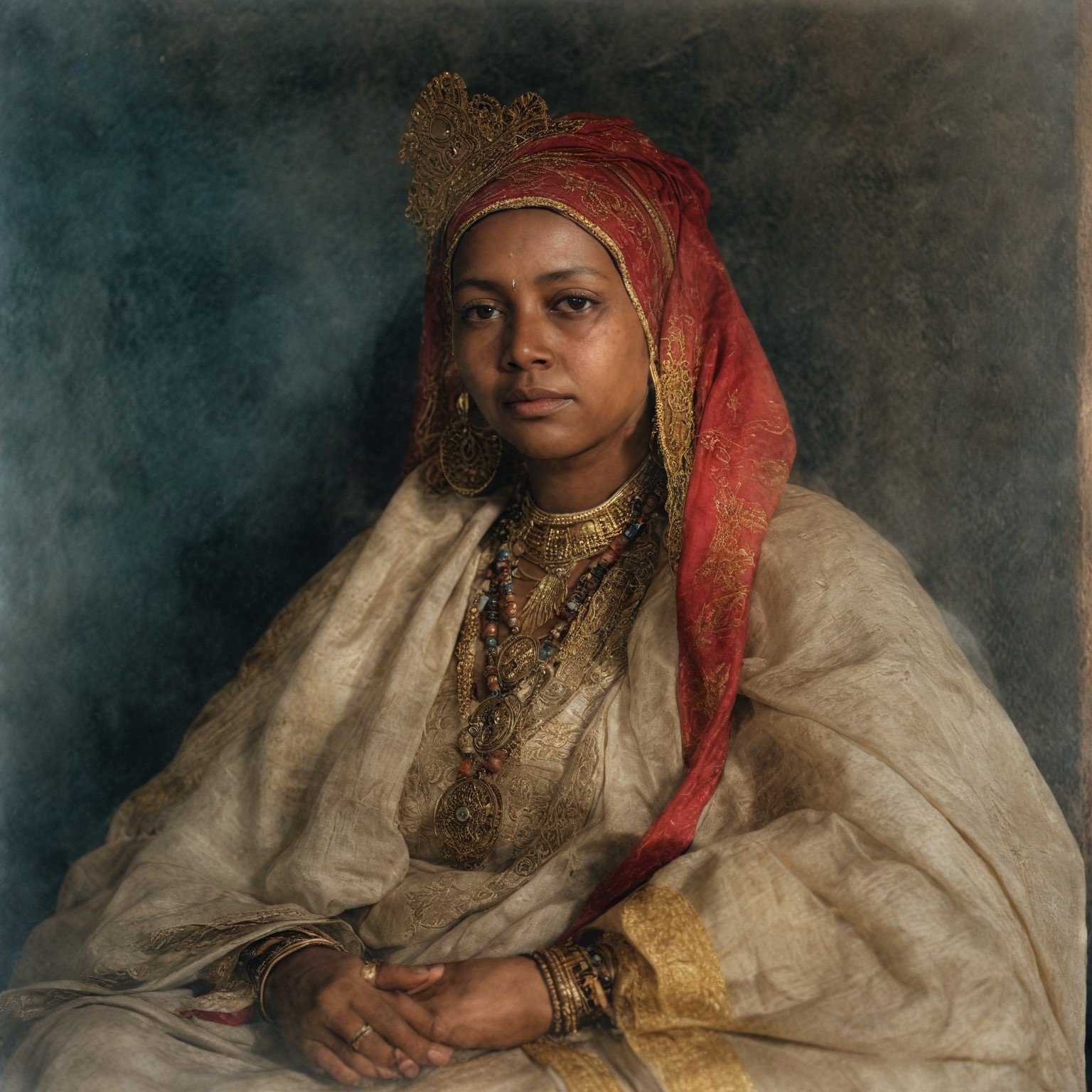
Empress Taytu Betul
Ethiopian Empire
1851 - 11 February 1918
“You want other countries to see Ethiopia as your protégé, but that will never be.”
Taytu Betul
Taytu Betul was a formidable Ethiopian Empress who fought colonization and was an intellectual master strategist who humiliated the Italians in battle with a crushing victory. The extraordinary queen reigned for 14 years, during which time she led her troops in a memorable battle and negotiated peace treaties.
She founded and established Ethiopia's modern capital city, Addis Ababa, during the country's territorial expansion. She contributed significantly to Ethiopia's reputation as the only African nation that has never been colonized. This African empress is unquestionably one of Ethiopia's greatest leaders.
Image generated by AI
Lineage
Taytu Betul was born in Simien province in 1851, during a period of rapid change in Ethiopia, to an aristocratic prominent Ethiopian family descended from the Solomonic dynasty. She was born into a Christian and Muslim family, and her given name Taytu (alternative spelling Taitu) translates as "sun" or "sunshine", which she would eventually become for her nation. Her father was a warrior named Ras Betul Haile Maryam. He was a member of the Simien province's ruling family and a direct descendant of Emperor Susenyos I.
Her mother's name was Yewubdar, and she came from a Gondar noble family. She was the third child of four children, two boys and two girls, who miraculously survived into adulthood during a time when birth conditions were difficult. Taytu came from a prominent and influential family, and she was known in Yejju, Simien, and Begemder for being fiercely proud of her lineage.
Early Life and Education
Taytu received an education, which was uncommon for women at the time due to women's educational opportunities being limited. She was a brilliant and exceptional student, capable of reading and writing Amharic and comprehending Ge'ez with ease. Ge'ez was once the sole language of Ethiopian Orthodox liturgy and was used in centuries-old sacred texts in Ethiopia, one of the world's oldest Christian nations. Due to her extensive knowledge of diplomacy, politics, and economics, it was assumed that she studied these subjects. Her interests included poetry composition, chess, and performing on the begena or lyre, a ten-string instrument.
Taytu grew up near a monastery, where she had a vision of herself wearing a crown one day. As a noblewoman, she was married off at the tender age of ten to an officer in Emperor Tewodros II's army, which was quite common at the time. According to oral history, she was subjected to genital mutilation at the age of three months, which was believed to be the probable cause of her barrenness. She married three more times and each marriage appeared to be unhappy, with one ending due to its abusive nature and the other providing her with a favorable divorce settlement. At the time, it was quite common for Ethiopian women to marry multiple times or take multiple lovers, and at that point, it was apparent she was unable to bear children.
Ascension to Power
Image taken from KentakePage
In April 1883, after four failed marriages, the noblewoman married her fifth husband, the King of Shewa at the time, who later became Menelik II. This made her his third wife and bestowed upon her the title of Empress of Ethiopia. Despite her inability to bear children, she was considered the ideal match due to her prior wealth and property acquisition. She was also a suitable wife due to her legitimate ancestry, and it was believed that she restrained his womanizing tendencies. Their wedding was a full communion service, which rendered their marriage canonical and irreversible, in contrast to his previous marriages. Their union was more than romantic; it was political in nature, as it resulted in the formation of alliances with northern regions and the expansion of southern regions, establishing one of history's most powerful alliances.
The Empress was portrayed as a devoted and respectful wife who shared equal status with her husband. She was a highly intelligent and valuable advisor to Menelik II, whom he consulted prior to making any decision. She played a significant role in administrative, political, military, and foreign affairs.
Menelik II frequently avoided endorsing unpopular and unpleasant positions or decisions that he did not wish to personally oppose by saying "Ishi, nega" (yes, tomorrow), whereas Taytu emphatically stated, "Imbi" (absolutely not). As a result, Menelik II became the most beloved monarch, while Taytu became the most powerful yet most despised and criticized woman in the land.
The Battle of Adwa
Image taken from AfroLegends
Empress Taytu was a military strategist who greatly assisted in orchestrating the downfall of Italy.
Emperor Menelik II signed a treaty of amity with Italy in 1889, dubbed the Treaty of Wuchale. Italy and Ethiopia established a partnership, but their treaties were translated differently. Ethiopia was now an Italian protectorate, according to the Italian version, while the Amharic version stated that it was merely a possibility that could be discussed further in the future. When Taytu discovered this, she became enraged and tore the treaty in half. Italy had already colonized neighboring Eritrea and the majority of Somalia, but she convinced the Emperor to declare war on Italian aggression when it attempted to colonize Ethiopia.
Empress Taytu led a force of 5,000 infantry and 600 cavalries against the Italians. Her battalion included female warriors who were escorted by men carrying red parasols to protect them from the sun. She fought valiantly on the front lines, inspiring anyone considering quitting. She recommended that the Italians' water supply be cut off during the Battle of Mekelle in order to dehydrate them and disgorge them from their heavily fortified positions on Endeyesus Hill. Additionally, the Empress analyzed all intelligence information gathered by her spies, which historians claim was critical to Ethiopia's victory at the battle. Menelik used this information to attack the Italians at a location of his choosing, Adwa rather than Adigrat, near the Eritrean border, where the Italians expected to have a logistical advantage due to their well-protected military base. Italians surrendered due to their disadvantage and lack of a water source.
This resulted in Ethiopia winning the war with a significant victory and gaining the reputation of being the sole unsubdued nation in Africa.
“Courage! Victory is ours! Strike!”
Taytu Betul
Death
Menelik II's health began to deteriorate following a stroke, and he died in 1913. During this time, the Empress assumed increased responsibility, but the Ethiopian elite and members of her royal family sought to depose her, claiming she had grown far too powerful. She eventually resigned after a bitter struggle to live a more sedate existence until her death on February 11th, 1918, from heart failure.
Historical Mark and Cultural Legacy
Taytu Betul, Ethiopia's legendary Empress and heroine, played a pivotal role in securing Ethiopia's independence from European colonization and paving the way for the decolonization of other African nations.
Ethiopia would not exist as a country today without her bravery, strength, devotion, and intellect. She is the embodiment of what is possible for those who are bold and courageous.
She founded and named Ethiopia's capital city, Addis Ababa, as well as financed the city's first hotel. Additionally, she prepared meals for prisoners and starving countrymen and worked to establish and promote a number of national industries, including wine production and candlemaking.
The phrase popularly used in Ethiopia and in Italy to describe lofty women is, “Chi si crede di essere, la regina Taitù?” which translates to, “Who does she think she is? Empress Taytu?”
Taytu Betul, whose name translates as 'sunshine,' is still referred to as "the Light of Ethiopia" to this day. Her legacy will forever be as Ethiopia's and Africa's greatest Empress. She truly is an African Queen who altered the course of history.
Image taken from AfroLegends
References
Gebrekidan, F. (2012). From Adwa to OAU: Ethiopia and the Politics of Pan-Africanism, 1896-1963. International Journal of Ethiopian Studies, 6(1/2), 71-86. Retrieved June 4, 2021, from http://www.jstor.org/stable/41756935
Prouty, Chris. Empress Taytu and Menilek II: Ethiopia 1883-1910.
Schwarz-Bart, Simone. In Praise of Black Women Volume 2: Heroines of the Slavery Era.
Chris Prouty. Empress Taytu and Menilek II: Ethiopia 1883–1910. Trenton: The Red Sea Press, 1986. ISBN 0-932415-11-3
Marcus, Harold G. The Life and Times of Menelik II: Ethiopia 1844–1913. Oxford: Clarendon, 1975.
Empress Taytu and Menilek II Ethiopia 1883 - 1910', Trentno: The Red Sea Press, 1986
geni_family_tree. n.d. Queens & Women Warriors of Africa genealogy project. [online] Available at: <https://www.geni.com/projects/Queens-Women-Warriors-of-Africa/14190> [Accessed 4 June 2021].
Encyclopedia.com. n.d. Taytu (c. 1850–1918) | Encyclopedia.com. [online] Available at: <https://www.encyclopedia.com/women/encyclopedias-almanacs-transcripts-and-maps/taytu-c-1850-1918> [Accessed 4 June 2021].
Britishmuseum.org. n.d. Collections Online | British Museum. [online] Available at: <https://www.britishmuseum.org/collection/term/BIOG172303> [Accessed 4 June 2021].
En.unesco.org. n.d. Taytu Betul pedagogical unit 2 | Women. [online] Available at: <https://en.unesco.org/womeninafrica/taytu-betul/pedagogical-unit/2> [Accessed 4 June 2021].
Rejected Princesses. n.d. Taytu Betul: The Bad Cop Empress of Ethiopia. [online] Available at: <https://www.rejectedprincesses.com/princesses/taytu-betul> [Accessed 4 June 2021].
(www.dw.com), D., 2021. Taytu Betul: Ethiopia's strategic empress | DW | 10.06.2021. [online] DW.COM. Available at: <https://www.dw.com/en/taytu-betul-ethiopias-strategic-empress-african-roots/a-57010781> [Accessed 4 June 2021].
Mesmo, M., 2019. The Ethiopian empress and master strategist behind the battle that humiliated the Italians in 1896. [online] Face2Face Africa. Available at: <https://face2faceafrica.com/article/the-ethiopian-empress-and-master-strategist-behind-the-battle-that-humiliated-the-italians-in-1896> [Accessed 4 June 2021].
Kentake, M., 2016. Empress Taytu: Warrior Queen of the 1896 Battle of Adwa - Kentake Page. [online] Kentake Page. Available at: <https://kentakepage.com/empress-taytu-warrior-queen-of-the-1896-battle-of-adwa/> [Accessed 4 June 2021].
Kalamu.com. 2014. HISTORY + VIDEO: Taytu Betul: the Great Ethiopian Empress who Said ‘NO’ to Colonization | Neo-Griot. [online] Available at: <http://kalamu.com/neogriot/2014/12/14/history-video-taytu-betul-the-great-ethiopian-empress-who-said-no-to-colonization/> [Accessed 4 June 2021].





